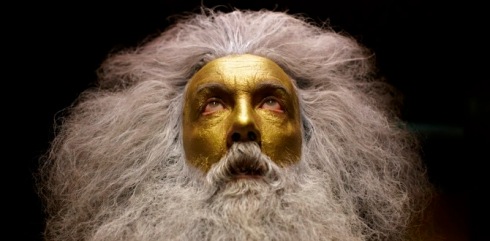
Alan Moore: “Don’t do anything you can’t live with forever.” Pic: © 2012 John Angerson, taken during filming of Jimmy’s End in Northampton
Following my feature on Alan Moore’s Jerusalem, I’ve been posting edited highlights from the 30,000-word interview transcript. In previous episodes, Alan Moore has joked about being God. In the last extract, he revealed how he came to the conclusion, like Doctor Manhattan in Watchmen, that time is an unchanging constant where everything that will happen has already happened and goes on happening forever, and it is only our perception that makes time appear linear.
Here, he brings the two together: his view of time effectively creates a secular eternity, and in so doing, creates a world-view that is just as compelling as any religion. Step inside the anti-Church of Alan Moore…
Alan Moore: “If you think about it, that [the idea that we are living in a time-static block universe] has got to pretty much kill religion, because there aren’t any religions that aren’t based on some kind of moral imperative. They’ve all got sin, karma or something a bit like that. In a predetermined universe, how can you talk about sin? How can you talk about virtue?
“My chapter Cornered, with the guilty council man, that was put in largely to talk about that issue. The thing is, we don’t have free will, or at least that’s what I believe, and I think most physicists tend to think that as well, that this is a predetermined universe. They don’t like it, but it is looking like that’s probably what it is. However, as long as we’ve got the illusion of free will, we’re fine.
“Also, I’m quite happy with my artistic decisions and career decisions, I’m pretty much guided by voices anyway, I couldn’t claim that I’ve got some sort of plan in all of this, I do what seems to be the next thing to do. That works just as well with free will as without it.
“It’s probably the most contentious point of the entire book, and also there’s the thing of when I first explained it to Leah, my daughter, she said, ‘yeah, I think I could live with that’. And so, sort of, when I explained it to Iain Banks [the late novelist], they were going through a painful divorce, and he said [Moore here does a passable Scottish accent], ‘Ah Jesus Christ, that’s the most terrible thing I’ve ever heard!’ He was really upset. And I can see that.
“We’re talking here about heaven and hell, we’re talking about them as being simultaneous and present, that all the worst moments of your life forever, that’s hell; all the best moments of your life forever, that’s paradise.
“So, this is where we are. We’re in hell, we’re in paradise, both together, forever.
“One of the dogma you can extract from this is, don’t do anything you can’t live with forever. Try to have a good life. Because you’re going to be having that life forever. Don’t be like my gran. She was a Christian, she had I think probably a very austere and miserable life because she was expecting that it would all be sorted out, and the first shall be last.
“Whereas if you know this is my only life, and it’s my only life forever, I’m not going to wait a moment longer before doing the things I should do to make it better. I’m not going to live my life in expectation of the very, very unlikely reward that awaits in heaven.”
Jerusalem is out now in hardback from Knockabout in the UK and Liveright in the US. For the full interview feature, click here.

Leave a comment